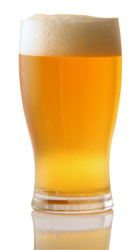I think that most of us here are capable in running the numbers, and calculating OGs and FGs, IBUs, SRM, etc. But what about the other side of recipe creation? For the most part this process isn't like making a dressing. You can't taste it at any given point and say, "This needs more of...". How do you take all of the ingredients we have at our disposal and turn it into something beautiful?A great beer is more than the sum of its partsRandy Mosher, Radical Brewing

Recipe Creation
#1

Posted 21 May 2009 - 12:17 PM
#2

Posted 21 May 2009 - 12:22 PM
trial and errorI think that most of us here are capable in running the numbers, and calculating OGs and FGs, IBUs, SRM, etc. But what about the other side of recipe creation? For the most part this process isn't like making a dressing. You can't taste it at any given point and say, "This needs more of...". How do you take all of the ingredients we have at our disposal and turn it into something beautiful?
#3

Posted 21 May 2009 - 12:41 PM
+1trial and error
#4

Posted 21 May 2009 - 12:57 PM
#5

Posted 21 May 2009 - 01:34 PM
Most people go about it exactly backwards. They take a bunch of ingredients, throw them together and then ask the question, "What will that taste like?" I think it's more productive to imagine what you want the beer to taste like and then choose the ingredients and process accordingly so that what you end up with hopefully tastes like you imagined it would.I think that most of us here are capable in running the numbers, and calculating OGs and FGs, IBUs, SRM, etc. But what about the other side of recipe creation? For the most part this process isn't like making a dressing. You can't taste it at any given point and say, "This needs more of...". How do you take all of the ingredients we have at our disposal and turn it into something beautiful?
#6

Posted 21 May 2009 - 03:41 PM
#7

Posted 21 May 2009 - 04:04 PM
#8

Posted 21 May 2009 - 06:31 PM
#9

Posted 21 May 2009 - 06:59 PM
#10

Posted 21 May 2009 - 07:11 PM
#11

Posted 21 May 2009 - 07:45 PM
#12

Posted 21 May 2009 - 08:01 PM
#13

Posted 22 May 2009 - 06:49 AM
+1Ive been brewing for about 4 years. About 1 year in I mostly gave up on recipies I found (unless I am looking for something specific). I just throw together ingredients that I think will make whatever style I am after.I write everything I do down in a notebook. If it comes out good, I make note of it. If its bad I usually write some notes speculating why its bad.Well, bad is a relative term. I think I have only made a few "bad" beers. Usually when I totally miss my BU:GU ratio or something like that. I have come up with a few recipies that I think are stellar, and some that are just OK.trial and error
#14

Posted 22 May 2009 - 09:21 AM
Absolutely! I start formulating recipes by using my "taste imagination". I think about what I want the finished beer to taste like. Then I use my experience and knowledge of ingredients to formulate a first try at the recipe. Finally, I brew it repeatedly, making small changes each time, til what I have in my glass matches what I have in my mind.Most people go about it exactly backwards. They take a bunch of ingredients, throw them together and then ask the question, "What will that taste like?" I think it's more productive to imagine what you want the beer to taste like and then choose the ingredients and process accordingly so that what you end up with hopefully tastes like you imagined it would.
#15

Posted 22 May 2009 - 11:35 AM
My attention span isnt that long. From the time I have my "taste imagination" to the time the finished beer hits my kegerator, I usually no longer have the desire to perfect whatever it wasAbsolutely! I start formulating recipes by using my "taste imagination". I think about what I want the finished beer to taste like. Then I use my experience and knowledge of ingredients to formulate a first try at the recipe. Finally, I brew it repeatedly, making small changes each time, til what I have in my glass matches what I have in my mind.
#16

Posted 23 May 2009 - 07:36 PM
I agree that's an issue. By the time a beer is ready, I may have shifted my attention to something completely different. Or the weather may have changed and I want something else. It seems that the beer I'm most interested in trying is the one in primary... which of course is the one that is the furthest from my draft faucet.My attention span isnt that long. From the time I have my "taste imagination" to the time the finished beer hits my kegerator, I usually no longer have the desire to perfect whatever it was
#17

Posted 28 May 2009 - 05:34 PM
Yeup - unless I started making 2 gallon batches my turn around time wouldn't be fast enough to tweak and remember what the old beer was like...I agree that's an issue. By the time a beer is ready, I may have shifted my attention to something completely different. Or the weather may have changed and I want something else. It seems that the beer I'm most interested in trying is the one in primary... which of course is the one that is the furthest from my draft faucet.
#18

Posted 28 May 2009 - 06:04 PM
This is kinda my thinking. I recently brewed a Belgian with something like 7 different grains just because I wanted to use them up. Sure, it might not be to style per se, but it is gooooood.I guess what I was trying to say in my previous post is don't be scared or intimidated. If you have the slightest clue about what should go in a mash, it'll turn out to be beer. It might not be what you wanted to make but odds are it will be drinkable. Then it's up to you to take it from there.
#19

Posted 29 May 2009 - 11:55 AM
And that is what some of the experts have done...I read read and read some more when I started. I also asked far too many questions...LOLCrafting great beers became my bible on early recipes, but just reading other recipes and understanding why an ingredient is in a recipe eventually comes to you.By now I have a certain amount of experience to craft based on my knowledge of what the outcomes should / could be.From my second brew I was tweaking recipes in some fashion or other. As I love cooking and have never been scared to experiment I guess this has carried across into brewingBUT Brewing is more like baking than it is like cooking.... the results are a long time in coming and small steps can affect the final outcome more than you realise.Of course , and I am sure you have done this , taking a recipe and brewing it EXACTLY the same as the guy next door , will usually create two beers not 100% the same, there are just far too many variables on our systems , cooling devices and pitch rates that effect the final outcome. We do a club big brew every year and it is amazing how different the final beers are, from the exact same Grains and Yeast.Experience and knowledge are the keys to great recipe formulation, plus a pinch of luck, and 1/2 bottle of IPA for inspiration. I think our biggest challenge as homebrewers is to be able to eventually brew the same recipe over and over again and get similar or same results, that only comes through solid and repeatable technique and accurate record keeping.Yeup - unless I started making 2 gallon batches my turn around time wouldn't be fast enough to tweak and remember what the old beer was like...
#20

Posted 29 May 2009 - 12:31 PM
I am another in this boat. I definitely formulate my beers backwards, or reverse engineer. I always picture what I want and then figure out what I need to do to get there. It works for me and I have had a great amount of success working out my beers this way.Absolutely! I start formulating recipes by using my "taste imagination". I think about what I want the finished beer to taste like. Then I use my experience and knowledge of ingredients to formulate a first try at the recipe. Finally, I brew it repeatedly, making small changes each time, til what I have in my glass matches what I have in my mind.
0 user(s) are reading this topic
0 members, 0 guests, 0 anonymous users
















